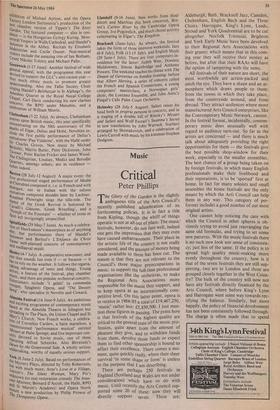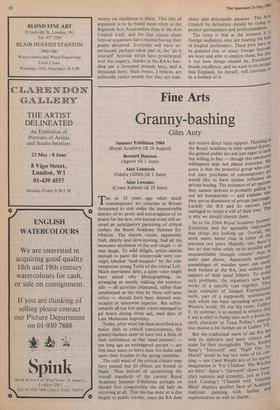Music
Critical
Peter Phillips
The Glory of the Garden is the slightly recently published adumbration of its ambiguous title of the Arts Council's forthcoming policies. It is in fact a title from Kipling, though the whiff of things operatic is not at all out of place. The music' festivals, however, do not fare well, indeed one gets the impression that they may even have caused embarrassment. Their place in the artistic life of the country is not really considered, and the amount of money being made available to them has been cut. The reason is that they are not relevant to the Council's three major preoccupations in music: to support the full-time professional organisations like the orchestras, to make the Regional Arts Associations more responsible for the music they support, and to keep opera at an internationally com- petitive level. On this latter point, opera is to receive in 1984/85 a total of £19,467,250, 'music' rather less:Z5,830,500. I just men- tion these figures in passing. The point here is that festivals of the highest quality are critical to the general state of the music pro- fession, quite apart from the amount of pleasure they give, and to withdraw funds from them, devolve those funds or expect them to find other sponsorship is bound to affect their excellence. There comes a mo- ment, quite quickly really, where their sheer survival 'in some shape or form' is useless to the purpose that I am describing.
There are perhaps 250 festivals in England (Scotland and Wales are not under consideration) which have to do with music. Until recently the Arts Council sup- ported some 20 of these: now they will directly support seven. These are:
Aldeburgh, Bath, Bracknell Jazz, Camden, Cheltenham, English Bach and the Three Choirs. Harrogate, King's Lynn, Leeds, Stroud and York Quadrennial are to be cut altogether. Norfolk Triennial, Brighton and York Early Music have been devolved to their Regional Arts Associations with their grants: which means that in this com- ing year they will receive their money as before, but after that their RAAs will have the option of tampering with the sums.
All festivals of their nature are short, the most worthwhile are action-packed and catch the eye. They have a shape and an at- mosphere which draws people to them: from the towns in which they take place, from the countryside around, and from abroad. They attract audiences where more manufactured Arts Council enterprises, like the Contemporary Music Network, cannot. In the festival format, incidentally, contem- porary music does unusually well with regard to audience turn-out. So far as the artists are concerned — and there is much talk about adequately providing the right opportunities for them — the festivals give the best possible shop-window for their work, especially to the smaller ensembles. The best chance of a group being taken on by foreign festivals, in which many English professionals make their livelihood and their reputations, is to be 'spotted' first at home. In fact for many soloists and small ensembles the home festivals are the only means by which the Arfs Council can help them in any way. This category of per- former includes a good number of our most original artists.
One cannot help noticing the care with which the Council in other spheres is ob- viously trying to avoid just rearranging the same old formulas, and trying to set some new patterns. With the music festivals there is no such new look nor sense of consisten- cy; just less of the same. If the policy is to spread high quality music-making more evenly throughout the country, how is it that of the seven festivals they are still sup- porting, two are in London and three are grouped closely together in the West Coun- try? The bulk of the country will now not have any festivals directly financed by the Arts Council, where before King's Lynn and Harrogate went some way towards rec- tifying the balance. Similarly, but more happily, the policy of financial devolvement has not been consistently followed through. The charge is often made that to spend
money on excellence is elitist. This line of argument is to be heard more often in the Regional Arts Associations than in the Arts Council itself, and for that reason alone festival organisers have resisted having their grants devolved. Everyone will have ex- perienced, perhaps taken part in, the 'do it yourself' festivals which have proliferated over the country, thanks to the RAAs han- ding out a thousand pounds here, and a thousand there. Such events, I believe, are politically rather sound; but they are tran-
sitory and principally amateur. The Arts Council by definition should be trying to protect permanence and professionalism,.
The irony is that at the moment it is foreign audiences who are hearing the best of English performers. These pros have to be grateful that so many foreign festivals are keen and able to employ them; but this is not how things should be. Excellence breeds excellence, and we want to be certain that England, for herself, will continue to be a hotbed of it.















































 Previous page
Previous page